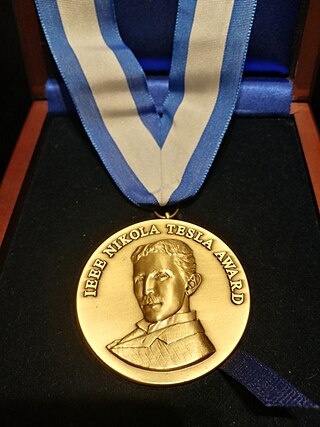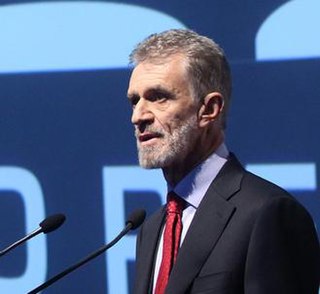Related Research Articles

Claude Elwood Shannon was an American mathematician, electrical engineer, computer scientist and cryptographer known as the "father of information theory". He was the first to describe the Boolean gates that are essential to all digital electronic circuits, and he built the first machine learning device, thus founding the field of artificial intelligence. He is credited alongside George Boole for laying the foundations of the Information Age.

Gerard Joseph Foschini, was an American telecommunications engineer who worked for Bell Laboratories from 1961 until his retirement. He died in September 2023. His research has covered many kinds of data communications, particularly wireless communications and optical communications. Foschini has also worked on point-to-point systems and networks.

Hendrik Wade Bode was an American engineer, researcher, inventor, author and scientist, of Dutch ancestry. As a pioneer of modern control theory and electronic telecommunications he revolutionized both the content and methodology of his chosen fields of research. His synergy with Claude Shannon, the father of information theory, laid the foundations for the technological convergence of the information age.

Anurag Kumar was the Director of the Indian Institute of Science at Bangalore, India from 2014–2020. He is a professor at the Department of Electrical Communication Engineering, and has served as the Chairperson of the Electrical Sciences Division at the Indian Institute of Science, before being appointed as the Director in 2014.

The IEEE Nikola Tesla Award is a Technical Field Award given annually to an individual or team that has made an outstanding contribution to the generation or utilization of electric power. It is awarded by the Board of Directors of the IEEE. The award is named in honor of Nikola Tesla. This award may be presented to an individual or a team.
Krishan Sabnani is an Indian-American networking researcher. He has made many seminal contributions to the Internet infrastructure design, protocol design, and wireless networks. Krishan made a breakthrough in Internet re-design. The main idea behind this work was to separate control functions and complex software from the forwarding portions on Internet routers. This work made it possible for forwarding technologies to evolve and be deployed independently from control protocols. This contribution is a precursor to the current Software Defined Networking (SDN) revolution. A patent based on this work won the 2010 Edison Patent Award.

Asad Ali Abidi is a Pakistani-American electrical engineer. He serves as a tenured professor at University of California, Los Angeles, and is the inaugural holder of the Abdus Salam Chair at the Lahore University of Management Sciences (LUMS). He is best known for pioneering RF CMOS technology during the late 1980s to early 1990s. As of 2008, the radio transceivers in all wireless networking devices and modern mobile phones are mass-produced as RF CMOS devices.
The IEEE Eric E. Sumner Award is a Technical Field Award of the IEEE. It was established by the IEEE board of directors in 1995. It may be presented annually, to an individual or a team of not more than three people, for outstanding contributions to communications technology. It is named in honor of Eric E. Sumner, 1991 IEEE President.
Parviz Jabehdar Maralani is an Iranian electrical engineering emeritus professor and fellow of the Academy of Sciences of Iran. He has contributed significantly to the education of electrical engineering in Iran and trained many students.

Dimitri Panteli Bertsekas is an applied mathematician, electrical engineer, and computer scientist, a McAfee Professor at the Department of Electrical Engineering and Computer Science in School of Engineering at the Massachusetts Institute of Technology (MIT), Cambridge, Massachusetts, and also a Fulton Professor of Computational Decision Making at Arizona State University, Tempe.

Mathukumalli VidyasagarFRS is a leading control theorist and a Fellow of Royal Society. He is currently a Distinguished Professor in Electrical Engineering at IIT Hyderabad. Previously he was the Cecil & Ida Green (II) Chair of Systems Biology Science at the University of Texas at Dallas. Prior to that he was an executive vice-president at Tata Consultancy Services (TCS) where he headed the Advanced Technology Center. Earlier, he was the director of Centre for Artificial Intelligence and Robotics (CAIR), a DRDO defence lab in Bangalore. He is the son of eminent mathematician M V Subbarao.

John Mathew Cioffi is an American electrical engineer, educator and inventor who has made contributions in telecommunication system theory, specifically in coding theory and information theory. Best known as "the father of DSL," Cioffi's pioneering research was instrumental in making digital subscriber line (DSL) technology practical and has led to over 400 publications and more than 100 pending or issued patents, many of which are licensed.
Keith W. Ross is an American scholar of computer science whose research has focused on Markov decision processes, queuing theory, computer networks, peer-to-peer networks, Internet privacy, social networks, and deep reinforcement learning. He is the Dean of Engineering and Computer Science at NYU Shanghai and a computer science professor at the New York University Tandon School of Engineering.
Mérouane Debbah is a researcher, educator and technology entrepreneur. Over his career, he has founded several public and industrial research centers, start-ups and held executive positions in leading ICT companies. He is now professor at Khalifa University in Abu Dhabi, United Arab Emirates and founding director of the Khalifa University 6G Research Center. He is a frequent keynote speaker at international events in the field of telecommunication and AI. His research has been lying at the interface of fundamental mathematics, algorithms, statistics, information and communication sciences with a special focus on random matrix theory and learning algorithms. In the communication field, he has been at the heart of the development of small cells (4G), massive MIMO (5G) and large intelligent surfaces (6G) technologies. In the AI field, he is known for his work on large language models, distributed AI systems for networks and semantic communications. He received multiple prestigious distinctions, prizes and best-paper awards for his contributions to both fields and according to research.com is ranked as the best scientist in France in the field of electronics and electrical engineering.

Bruce Edward Hajek is a Professor in the Coordinated Science Laboratory, the head of the Department of Electrical and Computer Engineering, and the Leonard C. and Mary Lou Hoeft Chair in Engineering at the University of Illinois Urbana–Champaign. He does research in communication networking, auction theory, stochastic analysis, combinatorial optimization, machine learning, information theory, and bioinformatics.

Panos Antsaklis is the H. Clifford and Evelyn A. Brosey Professor of Electrical Engineering at the University of Notre Dame and also Concurrent Professor in the Departments of Computer Science and Engineering and of Applied and Computational Mathematics and Statistics. He is a graduate of the National Technical University of Athens, Greece, and holds MS and PhD (1977) degrees from Brown University.

Roberto Tempo was an Italian scientist, known for his studies on complex networked systems in information technology.

Munther A. Dahleh is the William Coolidge Professor of electrical engineering and computer science and director of the Massachusetts Institute of Technology (MIT) Institute for Data, Systems, and Society (IDSS).
Mengchu Zhou is a Chinese-American Distinguished Professor of electrical and computer engineering in the Helen and John C. Hartmann Dept. of Electrical and Computer Engineering at New Jersey Institute of Technology (NJIT) and at Macau University of Science and Technology. He is the Chairman of IKAS Industries of Shenzhen in China and a Board Member of OneSmart Education Group headquartered in China.
Ness B. Shroff is an American engineer, educator and researcher known for contributions to wireless networking, network control, and network analysis. He is professor in ECE and CSE departments at Ohio State University, where he holds the Ohio Eminent Scholar Chaired Professorship of Networking and Communications.
References
- ↑ homepage Archived 2012-07-17 at archive.today at Columbia
- ↑ "Debasis Mitra | Electrical Engineering".
- ↑ "Debasis Mitra".
- ↑ Google Scholar Record for Debasis Mitra